Is Music Dead?
July 25, 2010 by Somebody
Recently a new Facebook friend asked what kind of music I enjoyed listening to. Part of my reply was:
"Honestly, I'm not as into music as I used to be. I don't consume it like I used to. I don't seek out new music because deep down inside I don't believe there's anything out there that will give me enjoyment like music in my past did. If I put a music CD into my car stereo, it's usually a mix CD with nothing on it that's more recent than 1995. I just don't care that much anymore."
My friend seemed bewildered at my response.
So what exactly is wrong with me? I have even started avoiding music that I do like so that I don't get sick of it. It's sad to contemplate the number of great songs that I can't appreciate anymore because I've heard them too many times (The old "Stairway to Heaven" syndrome). Therefore I treat a song that I love as a precious gem to be handled with care, and only listened to on special occasions. When I turn on the car radio, it occasionally ends up on an oldies or classic rock station, but it mostly stays on the news-talk programs of National Public Radio. What passes for Top 40 Radio these days leaves me feeling like a prehistoric corpse frozen deep in the ice of the Arctic tundra. I see a TV ad for the Grammy Awards and I shake my head in disgust at the list of nominees that are announced. My behavior seems to clearly suggest that I have lost faith in the music gods. Have they died? They clearly haven't been listening to my prayers for the last 15 years or so. I can't escape this feeling that we've been utterly betrayed by pop culture in general and by the record companies in particular.
At this point you might be saying to yourself, "This guy just hates music, period. He's some kind of creepy old puritan or something." There may be a grain of truth in that statement, but there was actually a time in my life when I spent almost every extra dollar I had on music. I read the music magazines with religious fervor and worried that I would miss some great new band's record. Deciding between Top 40 radio and album rock radio was a constant struggle, because both formats played great music.
Listening to those old pop songs from the 70s lets me return to a time that seemed more optimistic and carefree, a time when it was easier to feel good about yourself. There was no internet, video games, cell phones, or right-wing talk radio. People were polite to each other, sex was still dirty, and the only place to see graphic violence was in an R-rated movie. I spent those days reading comic books and science fiction paperbacks, building models, roller skating with my friends, and listening to my 45 singles. Yeah, I was a dork in my polyester shirt and braces, but life was good.
Part of the pleasure of the music experience of my youth was going to the record store and looking at all the strange and wonderful album covers. My first stop was always the Pink Floyd section, they had the best album covers, as well as some of the best music (I highly recommend the album with the cow on the front). Then I would check out the Doors, Supertramp, Credence Clearwater Revival, and Genesis albums. Then on to the The Beatles, Led Zeppelin, and Brian Eno. Maybe some Van Halen or Cheap Trick if I was feeling more rebellious than usual.
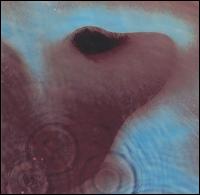

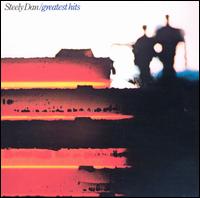

Some great album covers of the past by Pink Floyd,
Led Zeppelin, Steely Dan, and Genesis
When I got a little older, listening to my favorite music on headphones became a nightly routine. Before I went to sleep, I would turn off the lights, sit in my big comfortable chair, plug my headphones into the stereo, and let the sounds of Steely Dan's Greatest Hits, or Jimi Hendrix's Electric Ladyland wash over my brain in the dark. It was a form of mental relaxation that helped to keep me sane. My records were my best friends.
One day, around 1979, I came across the first B-52s album. Its cover featured the strange looking band members on a bright yellow background. It was a true WTF moment. The women with the big beehive hair kind of scared me. It wasn't until several years later that I actually heard the album, and it became one of my all time favorites.
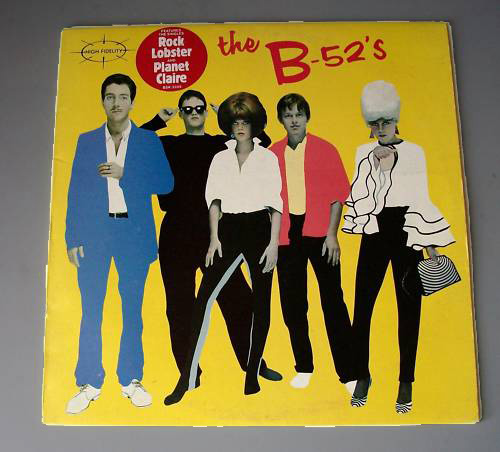
Another album cover that stopped me in my tracks was Stray Cats. They had even weirder hair than the B52s. I imagined the band to be some extreme permutation of the new wave genre, ready to change my life with some nihilistic profundities and punked-out sounds. One guy was playing a stand-up bass, and the drummer's kit consisted of a snare drum and a cymbal. They turned out to be a 50's rockabilly revival band with lots of marketing sense. Not what I expected, but somehow their sound ("Rock This Town," for instance) seemed to fit in with the whole quirky music scene of the early eighties.
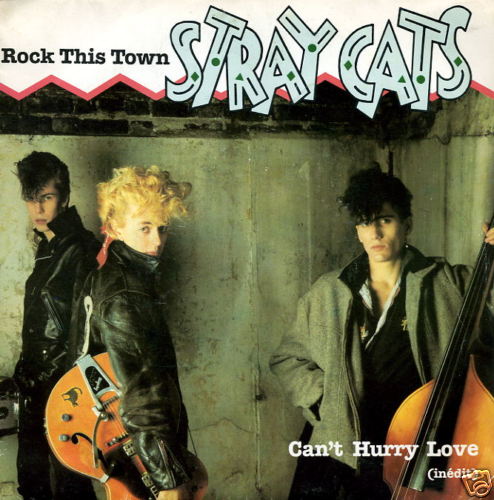
One album from that era that did have a major impact on my life was More Songs About Buildings and Food by Talking Heads. I picked it up from the record store one day, took it home, and was pleased with what I heard. The music was sparse and a little bit funky, with clean, undistorted guitars, keyboards, bass and drums. A nice touch for me was producer Brian Eno's spacey keyboard effects throughout the album, such as the echoing single notes on "Take Me to The River," which evoke the sound of dripping water.
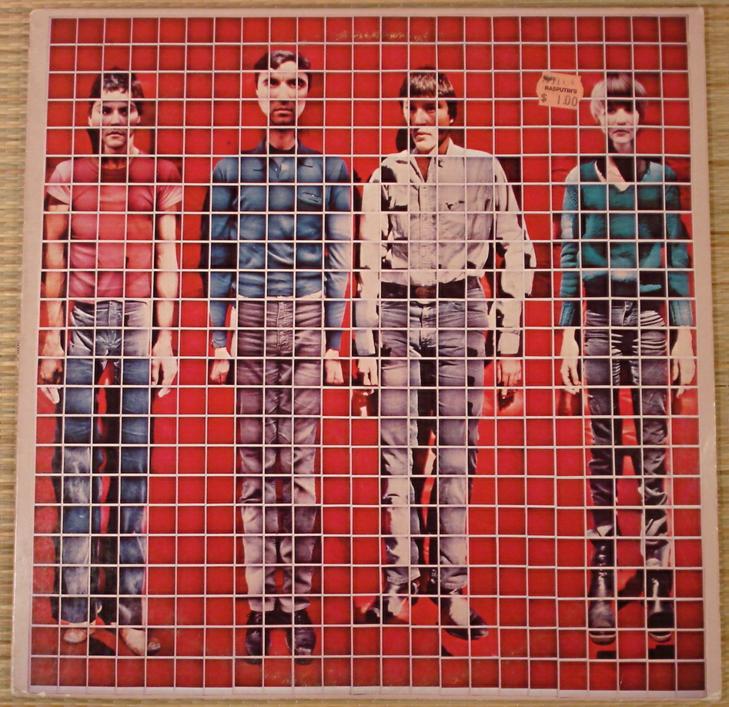
More Songs About Buildings and Food
Lead singer and guitarist David Byrne was the kind guy I could totally identify with, a high-strung nerd who, I was sure, had stood in my shoes, and who had once probably felt as lost as I did. His lyrics seemed to be giving me directions on where I should go, how I could find my way. "Stay hungry, stay hungry!" he urged on one song. The message of "Found a Job" in particular was powerful: Don't let the tragic TV shows playing in your mind determine your future, you can make up your own shows and take control of your life. The motivational lyrics didn't totally turn my life around -- I still had a lot of hard lessons to learn -- but they gave me the optimism and confidence to pursue some things that were important to me, such as making new friends and learning to play guitar.
In the early 80s a new phenomenon emerged known as Music Television. I was a big fan of MTV in its early days. The channel's programming consisted of nothing but music videos. They featured a lot of the techno-pop and new wave type artists that I liked, such as The Cars, Peter Gabriel, XTC, Wall of Voodoo, The Fixx, Thomas Dolby, Men At Work, Split Enz, Flock of Seagulls, and The Police, just to name a few. These early 80s vids seemed interesting and artistic, as opposed to the half-naked gyrations and cooler-than-thou posturing that defines most of today's efforts. I didn't suspect that V.J. Martha Quinn's sweet smile would turn out to be a trojan horse, as foretold in the song "Video Killed the Radio Star," and from that moment on the music industry began to devolve to the point where the music -- that is, the sound you hear when the video is playing -- was last on the list of the record companies' priorities, after the artist's image, clothes, and attitude.
Around 1990, the compact disc began to replace vinyl albums as the recording format of choice. The record companies touted the CD's superior sound quality, and were no doubt pleased when music fans began to repurchase their entire record collections in CD form. I don't want to debate the pros and cons of the CD, but one drawback that is rarely talked about is the fact that CDs reduced the album cover art to being a paper insert several times smaller than the cover of a vinyl album. Covers became less of a priority in the music industry than vinyl covers had been. Many artists today just settle for a picture of their face on the cover, which only adds to the sense that creativity has vanished from the music scene.

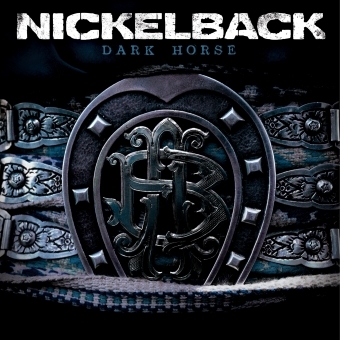

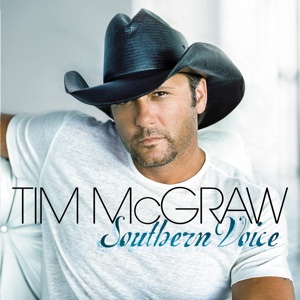
A sampling of today's best selling artists
When discussing the factors that contributed to the death of good music, the role of American Idol also needs to be considered. Suddenly the entire country has turned into Simon Cowell. If you can't sing in perfect pitch in the style of Mariah Carey, America doesn't have time for you. Also, you need to be young, thin, and attractive. All this excessive criticism by people who don't know much about music has fostered a national mood of artistic cautiousness, kind of like the feeling in Germany when Hitler was taking over. Personally, I always thought the so-called bad singers on Idol were a lot more interesting than the good ones.
I'm surely not the first to wonder how certain popular artists of yesteryear would fare under the disdainful glare of Cowell and company. One of the things that made Talking Heads' music stand out was the fact that singer David Byrne was clearly not a singer by any professional standard. In spite of this, his band was given a contract by a record company and they sold millions of albums as a result. Good music is not about being a flawless performer, it is about conveying ideas that connect with your listeners. Anybody who has the guts to stand up and try to convey their musical ideas is worthy of great respect in my opinion. So no Idol for me, thanks.
My dad would probably agree that music is dead, but he would say it ended around 1955. He was 25 then. He loved big band jazz of the 30s and 40s, but saw be-bop jazz of the 50s as a cruel betrayal and a descent into drug-addled debauchery. As for the subject of rock music, "What's that noise?" was the closest he ever got to acknowledging its existence. I was 25 in 1990, and it was about 5 years later that my enthusiasm for popular music began to wane. My reaction to underground dance music being supplanted by gangsta rap, in retrospect, was eerily reminiscent of my old man's views of be‑bop. This begs the question: Is love of music just a stage of human development that occurs during a person's youth, and then fades in adulthood? This would explain why each generation decides music is dead after they hit age 30 or so. That's the biological explanation: music is dead to me because I'm old.

There can be no doubt that since the beginning of recorded music, and probably before recorded music, people have been declaring music to be dead. To people who grew up listening to big band jazz and easy listening, 50s rock artists like Elvis and Chuck Berry probably sounded like an old junk car with a bad muffler. The trend of synthesizers and keyboards in the late 70s and early 80s was hated by many hard rock and hardcore punk fans. Hard rock icons Boston even went so far as to have the phrase "Contains No Synthesizers" printed on the back on their second album, like some kind of musical ingredient label. The hardcore punks also hated disco, new wave, progressive rock, country rock, and just about every other type of music except hardcore punk. They found themselves divided on the issue of speed metal, which sounded a lot like hardcore, but with tighter playing, added testosterone, and an IQ level down in the lower double digits. I must confess, a lot of the music I have liked over the years -- specifically easy listening, disco, new wave, techno, and soft rock -- are genres other people have pointed to as proof that THEIR music was dead. So maybe this business of music being dead is just a matter of personal taste.
There obviously are plenty of reasons to have optimism about the future of music. Internet sites such as iTunes and MySpace have made it possible for thousands, if not millions, of bands and music artists to get their music into the ears of potential consumers. These bands and artists would have had few avenues for self-promotion before the invention of the web. This is adding a much needed element of democracy to the music business, in which the consumers decide which bands succeed instead of a handful of profit-crazed business executives. As a consumer of music, I no longer have to search the record stores for the music I want. I can just jump online and download it.
But don't get out the champagne and party hats just yet. Most of these do-it-yourself artists don't have budgets and resources comparable to artists with record contracts. You may find you have a few extra details to take care of on your journey to stardom. First you have to find a place to record. You'd better make sure your neighbors are huge fans of your death metal band before you crank up the amps in your apartment. In addition to musical instruments, you have to obtain expensive recording equipment and software, and you have to become an expert on today's high-tech recording methods. You'll also need insurance on that stuff so you can sleep at night, some of the guys hanging around with the band seem kind of shady. Imagine that.
If you're making CDs, you'll need to come up with some cover art. You've probably got a friend somewhere with good illustrating skills, but then you'll need some graphic design software to format the art, add text, etc. Ever used Photoshop? You're in for a treat. Then you'll have to cough up a nice chunk of change to have the CDs and covers made. Next you'll have to set up a website with a paypal account or some other means for people to buy your CD online. Maybe one of the other band members knows how to do that stuff. Good for you.
You'll also need a cool MySpace page and other pages to promote your band. You'll need some good looking band photos to put up there too. No problem, your girlfriend has a decent camera. Oh, one last thing. When those CD orders start coming in, somebody's got to box up the merchandise and take it down to the post office to mail it. That's a lot of hats for today's self-sufficient young music artist to wear. The recording process alone would reduce most people to tears. I speak from experience.
Maybe if I was younger I would have the energy and patience to seek out interesting new sounds by these internet artists. This needle-in-the-haystack approach to finding music leaves a lot to be desired, but there doesn't seem to be any other option. The major labels, and their enabling accomplices in the music press, can certainly no longer be counted on to promote anything but disposable trash. The traditional outlets for new music -- radio, television, and even the internet to some extent -- are controlled by large corporate conglomerates who no longer consider intelligent music to be a pathway to profits. Best to dumb it all down and add as much auto-tune to the vocals as possible. Those ridiculous robotic voices are the perfect symbol of today's music industry.
Music as I knew it and loved it is dead, and I don't suppose anyone cares. So I will resign myself to the role of nostalgic archeologist. I will honor the memory of my deceased, leave flowers on its grave every so often, and never again take good music for granted.
Do you have strong opinions about the past, present, or future of music? Send your music essay of at least 1000 words to somebody@somebodyswebpage.com with "Is Music Dead?" in the subject line.
Copyright 2010 by Somebody's Webpage







